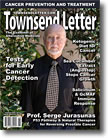|
Part 1, 2, 3
Cancer has multiple cellular processes that allow it to thrive, proliferate, and spread. In order for a cancer therapy to be effective, it must be able to simultaneously address these processes. While there are many cancer therapies available in the market today, many of them have limitations, such as side effects, limited cancer targets, and more. Here we discuss Angiostop, a special sea cucumber extract, and how it can fill in the gaps that many conventional treatments are not able to provide.
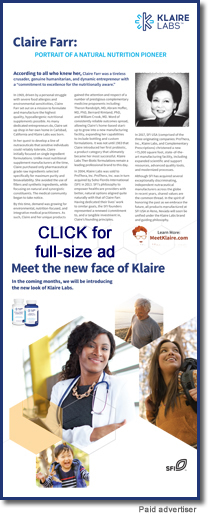 Over the last two decades, various studies have explored and demonstrated the multiple mechanisms of sea cucumbers against cancer. This comes as no surprise for some cultures. In Chinese folk medicine, it has been an integral part of their therapies for centuries, primarily used as treatment for stomach ulcer and stomach cancer. It has also been studied for its effects on oral gingivitis, effectively reducing gum bleeding and other symptoms.1 It was not until recent years that scientists have identified what makes sea cucumbers effective for cancer. Triterpene glycosides from sea cucumbers, in particular, have shown multiple anti-cancer mechanisms, such as angiogenesis inhibition, receptor tyrosine kinase inhibition, induction of apoptosis, and caspase activation. This makes Angiostop an attractive candidate for natural cancer therapy supplementation. Over the last two decades, various studies have explored and demonstrated the multiple mechanisms of sea cucumbers against cancer. This comes as no surprise for some cultures. In Chinese folk medicine, it has been an integral part of their therapies for centuries, primarily used as treatment for stomach ulcer and stomach cancer. It has also been studied for its effects on oral gingivitis, effectively reducing gum bleeding and other symptoms.1 It was not until recent years that scientists have identified what makes sea cucumbers effective for cancer. Triterpene glycosides from sea cucumbers, in particular, have shown multiple anti-cancer mechanisms, such as angiogenesis inhibition, receptor tyrosine kinase inhibition, induction of apoptosis, and caspase activation. This makes Angiostop an attractive candidate for natural cancer therapy supplementation.
Angiostop Inhibits Angiogenesis
Angiogenesis is one of the main hallmarks of cancer as it is the formation of new blood vessels that drives tumor growth. Inhibiting angiogenesis has been a key strategy in order to reduce the size of tumors to make them operable or to reduce the chance of local relapse or metastasis.2
Studies have demonstrated that Angiostop inhibits angiogenesis. This mechanism starves tumors and eventually leads to cancer cell death (apoptosis). In vitro and in vivo studies have shown that Angiostop disrupts all three processes involved in angiogenesis: proliferation, migration, and tube formation.3-6 This is more clearly illustrated in the following case report.
A 42-year-old female patient underwent chemotherapy for two months from April 11 to June 28, 2005. A mammogram and ultrasound right after that came back positive. Beginning June 28, she took Angiostop. After two months, her results have been remarkable. It appears angiogenesis has receded (see Figure 1).
Figure 1. Thermal Image Illustrating Angiogenesis Inhibition by Angiostop
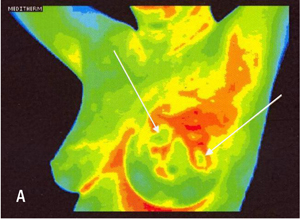 |
August 24:
Figure 1A. Angiogenesis is evident around the two breast tumors (represented by dark areas). |
April 11:
Figure 1B. Angiogenesis apparently increased around the area. |
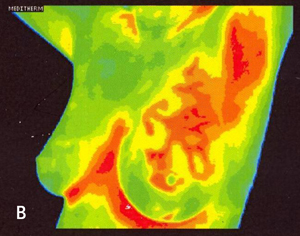 |
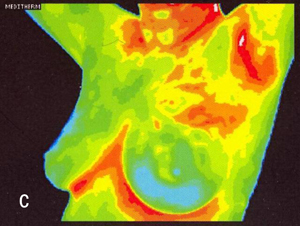 |
June 28:
Figure 1C. Angiogenesis significantly reduced after taking Angiostop. |
| |
|
Angiostop Inhibits Tyrosine Kinase Receptors
We all have microscopic cancers waiting to grow. According to studies, about 40% of women between 40 and 50 years old have microscopic breast tumors. Fifty percent of men between 50 and 60 years old have microscopic prostate tumors, and 100% of people of 70 years old have microscopic thyroid tumors.7
Signals from microscopic cancers can prompt the body to release angiogenic factors, such as growth factors or tyrosine kinases. One of the reasons for Angiostop's anti-angiogenic effect is its inhibition of growth factor receptors or tyrosine kinase receptors (RTKs) that promote proliferation, angiogenesis, invasion and metastasis and prevent apoptosis. Evidence shows that Angiostop can inhibit five different growth factors receptors:
- VEGFr – Vascular Endothelial Growth Factor Receptor
- EGFr – Epidermal Growth Factor Receptor
- PDGFr – Platelet-Derived Growth Factor Receptor
- FGFr – Fibroblast Growth Factor Receptor
- IGFr – Insulin-like Growth Factor Receptor
Angiostop was previously shown to inhibit four growth factor receptors or tyrosine kinase receptors (RTKs): VEGFr, EGFr, PDGFr and FGFr (Illustrated as rectangles in Figure 2).3‑4 Furthermore, Angiostop was also shown to suppress other RTKs involved in downstream VEGF signaling, such as Akt, ERK, FAK and paxillin (See Figure 2). This is significant because it means better suppression of angiogenesis and other cancer processes.
Figure 2: Angiostop's Multiple Pathways of Suppressing Cancer
(Numerous references back to this figure in the text below)

Angiostop Shown to Inhibit IGFr, FGFr, VEGFr in Colon Cancer
The Research Genetic Cancer Centre (RGCC), headquartered in Greece, specializes in medical genetics and performs personalized sensitivity testing on circulating tumor cells (CTCs) from actual cancer patients. Dr. Ray Hammond, DC, NMD, Director of the US Division in Texas shared that Angiostop is a very potent extract, effective on six to seven different types of cancer that they have tested, including breast, lung, prostate, colorectal, pancreatic, and liver cancer.
He provided one of the chemosensitivity assessment results (see Figure 3). In colon cancer cells of a patient, Angiostop inhibited IGFr, FGFr and VEGFr by 19%, 24% and 26%, respectively. In cancer genetic testing, a drug or supplement with an inhibition rate of more than 10% is considered an excellent anti-cancer agent.
Figure 3: Example of Research Genetic Cancer Centre (RGCC) Analysis Shows Angiostop’s Effect on FGFr, VEGFr, IGFr in Colon Cancer Patient

The Insulin-like Growth Factor (IGF) has become a worthwhile cancer target in recent years. It is elevated in almost all types of cancer, including colorectal, breast, and prostate cancer. Specifically, it promotes cell cycle progression, angiogenesis, and inhibition of apoptosis through activation of its receptor, IGFr.
The chemosensitivity test results provided by RGCC are of great significance because there has yet to be an approved IGFr inhibitor. In order to better manage cancer, IGFr also needs to be inhibited.
Many studies have shown that hyperinsulinemia, as well as insulin resistance and hyperglycemia, is associated with increased cancer risk (see Table 1).7-13 Colorectal cancer risk, for example, increases by 17% to 42%. Gastric cancer risk increases by up to 101%, breast cancer by up to 300% and endometrial cancer by up to 4500%. IGFr, which is promoted by increased insulin levels, therefore needs to be inhibited in order to reduce these risks.
Table 1: Increased Cancer Risk is Associated with Hyperinsulinemia

The chemosensitivity test provided by RGCC is of great significance because there has yet to be an approved IGFr inhibitor. In order to better manage cancer, IGFr is an important target.
Part 1, 2, 3
|
![]()
![]()
![]()
![]()




